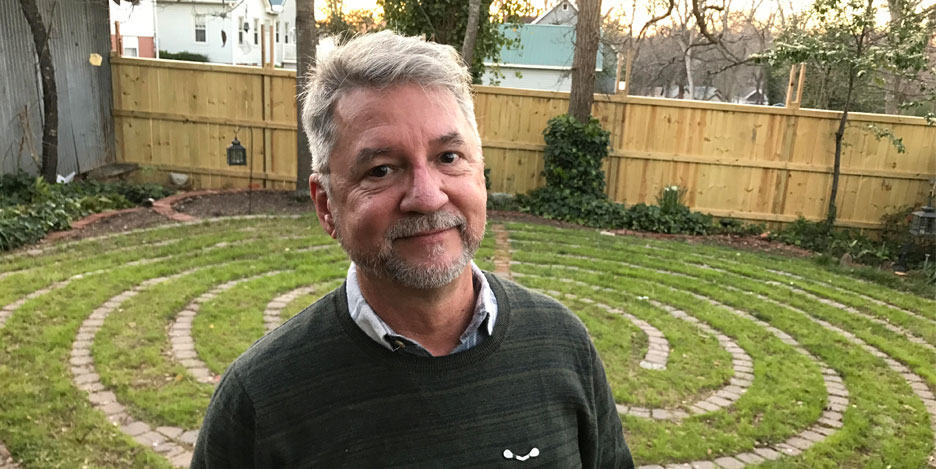Dale Lyles is a retired educator who is using his retirement to do all those things he said he would do when he retired: write, compose, garden, create cocktails. He blogs at Lichtenbergianism.com and dalelyles.com, and you can follow him on Twitter at @Lichtenbergian.
In 2007, you and a group friends formed the Lichtenbergian Society, dedicated to upholding 18th-century physicist Georg Christoph Lichtenberg’s commitment to procrastination. Could you please tell us more about the Society and what motivated you to start it?
In the fall of 2007 I was feeling a little bored and a little lonely, and so I invited a handful of men to join me around my fire pit on the Winter Solstice and argue about the nature of Art. All of these guys had been a part of the theater scene in Newnan (GA) and were readers of my blog, and I figured it would be fun just to hang out, drink, and argue stupid stuff.
One day on the blog we were arguing over the viability of older art forms like opera, the symphony, etc., and for some reason Turff threw in the following quote: “To do the opposite is also a form of imitation,” by one Georg Christoph Lichtenberg. I thought it was an interesting quote and headed over to Google to learn more about this Lichtenberg fellow. I discovered that he was an 18th-century German physicist/professor, and that he is still well-known in Europe as the author of hundreds of similarly witty aphorisms.
And then there was this passage: “Lichtenberg was prone to procrastination. He failed to launch the first ever hydrogen balloon, and although he always dreamed of writing a novel à la Fielding’s Tom Jones, he never finished more than a few pages.” Surely, here was our patron saint, since as a group we always had big ideas but rarely carried them out.
We decided to form the Lichtenbergian Society, dedicating ourselves to the principle that procrastination is key to creativity. Our motto: Cras melior est, i.e., “Tomorrow is better.” We drafted a charter, elected officers, and set about putting off until tomorrow what we might well have done today. We have our annual meeting, and we go on a fall retreat (to work on those things we haven’t been working on), but mostly we meet around the fire and drink and talk.
What have been the results of this experiment for you and your friends?
A very odd thing happened. After a couple of years, we noticed that more and more of us were not only carrying out most of our goals, we were becoming more successful and productive. We were publishing books, composing music, getting Equity cards, even “becoming a corporate tool” in a major way.
This was so counterintuitive and so opposed to our core principles that we actually instituted Censure as part of the annual meeting’s agenda: a tongue-in-cheek way to recognize our members’ successes by shaming them for that success. This year, in fact, I was stripped of my chairmanship which I had held with distinction for ten years, simply because I had written and published Lichtenbergianism: Procrastination as a Creative strategy (as well as accomplishing all of my stated goals for the year — an indefensible state of affairs for a Lichtenbergian).
A couple of years ago I distilled the threads of our discussions about art and how we achieve it into the Nine Precepts of Lichtenbergianism. The whole thing is counterintuitive, but it provides a framework that works. As I say in the introduction of the book, none of this is new: it’s just the same creative process that everyone else has written books about, but approached in a sideways fashion.
Procrastination is often perceived to be a negative. What, in your view, makes it a positive? How do you get things done if you avoid doing them?
It’s a plague upon our culture, this negative view of procrastination. Every time I go to read an article about how to be more creative, it almost always turns out to be about how to be more productive, and those are not the same things at all.
Also, every time people hear the title of my book, they joke that they do their best work at the last minute — but that’s not what Lichtenbergianism is about either. When we talk about procrastination, we’re actually referring to what John Perry calls “structured procrastination,” i.e., you can accomplish anything as long as it’s not what you’re supposed to be working on at the moment.
A Lichtenbergian will always have several things he/she should be working on, and that allows him to do something else instead. The very first year of the Lichtenbergian Society, I didn’t accomplish a single one of my stated goals. I did, however, design and build a seven-circuit labyrinth in my backyard. Similarly, many of our most successful accomplishments got done because we were avoiding other projects altogether.
There are a couple of other aspects of Lichtenbergian procrastination that are worth mentioning.
The first is that laying aside a project, avoiding it, allows it to gestate. It gives you room to step back and take a look at it, which is the Lichtenbergian Precept of GESTALT: what’s missing from the project that would make it more complete?
The other aspect is the joke that began our entire journey, the idea that the world would be better off if certain artists had actually procrastinated longer before releasing their emo poetry or death metal CD or Thomas Kincaid upon the world. We call it Corroborative Evidence, and part of our annual ritual is displaying examples of such work and then burning it.
Followed by a toast, naturally.
What’s one piece of advice you would give to others regarding how, and why, to embrace this approach?
First, buy my book, of course. (One of my Lichtenbergian goals this year is to become a self-promoting fiend: check out Lichtenbergianism.com and follow me on Twitter @TheLichtenbergian).
I think the most important message we bring to the world is that failure is always an option. People who, like Lichtenberg himself, “always wanted to write a novel” will often never get around to it because they’re afraid they’ll do it “wrong,” and so they never begin.
Lichtenbergianism frees you from the fear of messing up because it helps you understand that messing up is how all art begins. Only Mozart does it perfectly the first time — and he’s dead.
So open that notebook or Word document or Finale file or sketchbook, and write ABORTIVE ATTEMPT at the top of the page. Make a mark. Make another mark. Stop making marks. Turn the page and write ABORTIVE ATTEMPT at the top. Make a mark.
You’ll be surprised at how much you can accomplish if you just procrastinate enough.
Bold


